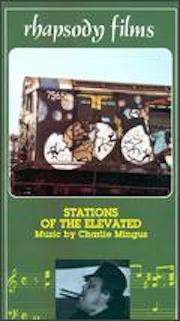Stations of the Elevated
Stations of the Elevated is a 1981 documentary film by Manfred Kirchheimer about graffiti in New York City. It debuted at the New York Film Festival. It was re-released June 27, 2014 and shown at the Brooklyn Academy of Music and will be re-released throughout the United States in the fall of 2014. Reviews were generally positive.
| Stations of the Elevated | |
|---|---|
 | |
| Directed by | Manfred Kirchheimer |
| Produced by | Manfred Kirchheimer |
| Music by | Charles Mingus, Aretha Franklin |
| Cinematography | Manfred Kirchheimer |
| Edited by | Manfred Kirchheimer |
Production company | Streetwise Films |
| Distributed by | First Run Features |
Release date | 1981 at New York Film Festival |
Running time | 45 minutes |
| Country | United States |
| Language | English |
Background
Kirchheimer had come to the United States as a child in 1936 with his parents to escape Nazi Germany. He filmed Stations of the Elevated in 1977 and he had not known anyone who created graffiti before he started. Most people viewed graffiti artists as a nuisance at best and vandals at worst. Kirchheimer wanted to "elevate" their work as suggested in the title.[1][2][3]
He told NPR that he would drive to the Bronx and film the trains going overhead:[1]
They would come by and it would be screaming full of colors — just gorgeous ... The smart thing I did was shoot it all outdoors. Most of the lines are indoors, and the way most people see these paintings was indoors. Doing it outdoors gave a whole other perspective.[1]
Since the making of the film, New York City has completely eradicated graffiti appearing on subway cars, so the film documents an art form that no longer exists.[2]
Stations of the Elevated debuted in 1981 at New York Film Festival. The 2014 release of Stations of the Elevated is newly restored[4] and is nearly 33 years after the first release; it was shown at BAM with a live performance of the soundtrack from the Mingus Dynasty.[5] When it was first released, it received no reviews and was essentially forgotten after its premier at the New York Film Festival.[3]
Subject
This was the first film to document the graffiti movement in New York City, but it is not a documentary in the ordinary sense.[1] There is no narrator and very little dialogue. Instead, subway cars covered with graffiti are followed as they move along the rails to a jazz soundtrack by Charles Mingus with Aretha Franklin.[1][2][4][6][7][8] According to Leigh Silver, "... Kirchheimer captures the urban jungle in all of its untamed glory; shooting from behind branches and between scaffolding, Kirchheimer awaits the lumbering subway trains as they snake across tracks."[9]
At one point in the film, a group of boys are watching the trains whiz by and one boy says: "That one was all right. Wasn’t nothing special. The idea was good".[8]
According to Kevin Jagernauth writing for Indiewire, the graffiti artists featured are "Lee, The Fabulous 5, Shadow, Daze, Kase, Butch, Blade, Slave, 12 T2B, Ree, and Pusher".[4]
Kirchheimer, in his documentary film, also asks visually: How does this artwork that was deemed illegal coexist in a city with advertising that is deemed legal [and] that is possibly more offensive?"[1] He does this by contrasting graffiti covered subway cars with billboards covered with images of cigarettes, alcohol, and scantily dressed women.[1][2][7][8][9]
Critical reception
Rotten Tomatoes has three reviews all favorable but not enough to score the film.[10] Daniel Walber said that viewing the film made him feel as though it was made by an extraterrestrial and it did so because "it presents the trains as the real New Yorkers".[2] Writing for Complex, Leigh Silver explains "... Stations of the Elevated has lasting power, a certain timelessness that speaks to the soul of New York."[9] Joe Bendel writing for The Epoch Times, concludes that while Kirchheimer "has a keen eye for visual composition. ..., there is not a lot of charm to the images he captures. Frankly, he largely vindicates Mayor Koch’s withering assessment—this is blight we are looking at".[5]
References
- Rose, Joel (26 June 2014). "After Decades On VHS, Graffiti's Golden Age Returns To Big Screen". NPR. Archived from the original on 27 June 2014. Retrieved 27 June 2014.
- Walber, Daniel (24 June 2014). "BAMcinemaFest: 'Stations of the Elevated' Is the Most Important New York City Movie of the Year". Nonfics. Archived from the original on 27 June 2014. Retrieved 27 June 2014.
- Perlman, Matthew (17 June 2014). "MT-spray: Old doc about subway graffiti finds new life at BAM". The Brooklyn Paper. Archived from the original on 27 June 2014. Retrieved 27 June 2014.
- Jagernauth, Kevin (10 June 2014). "Exclusive: Poster For Restored 1981 New York City Portrait 'Stations Of The Elevated'". Indiewire. Archived from the original on 27 June 2014. Retrieved 27 June 2014.
- Bendel, Joe (25 June 2014). "'Stations of the Elevated': The Graffitied '70s". The Epoch Times. Archived from the original on 27 June 2014. Retrieved 27 June 2014.
- Staff. "Stations of the Elevated (1980)". New York Times. Retrieved 27 June 2014.
- Scherstuhl, Alan (25 June 2014). "The Paint-Bombed Stations of the Elevated Is a Masterpiece of Train- and Tag-Spotting". The Village Voice. Archived from the original on 27 June 2014. Retrieved 27 June 2014.
- Hardy, Ernest (3 September 2003). "In the Beginning: Hip-Hop at the Movies". LA Weekly. Archived from the original on 27 June 2014. Retrieved 27 June 2014.
- Silver, Leigh (6 June 2014). "Graffiti Documentary "Stations of the Elevated" Is Playing at the Brooklyn Academy of Music This Month". Complex. Archived from the original on 27 June 2014. Retrieved 27 June 2014.
- "Charles Mingus - Stations of the Elevated Reviews". Rotten Tomatoes. Retrieved 2 July 2014. Note: Rotten Tomatoes misattributes the making of the film Charles Mingus instead of Manfred Kirchheimer.